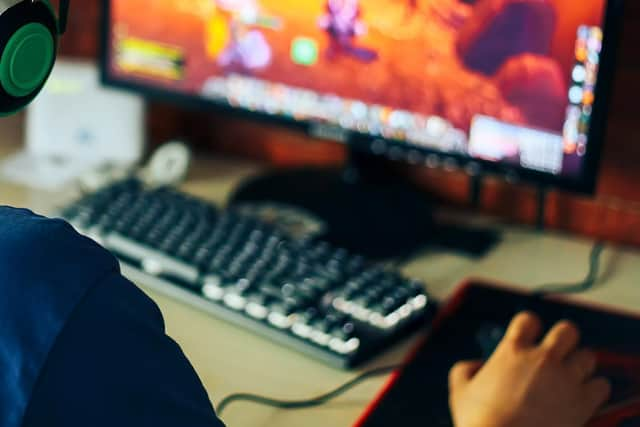'It's a hidden addiction': Psychologist warns of rise in online gambling during Covid-19 lockdown in Leeds
Matthew Gaskell from the Northern Gambling Service says a public health approach at government level is the most effective way of tackling what he has branded “the hidden addiction”.
It comes just days after the UK's biggest gambling firms agreed to remove all TV and radio advertising for games and products during the coronavirus lockdown, and, after the Government wrote to firms asking them to provide regular updates on how they are tackling problem gambling during the lockdown.
Advertisement
Hide AdAdvertisement
Hide AdAround 30,000 people have a ‘problem gambling’ addiction in Leeds, latest figures show, and a study by Leeds Beckett University revealed that the city has potentially twice the national average rate of addiction.


Mr Gaskell said it was difficult to get an accurate picture of the situation as there had been no national prevention service since 2010 and researchers were working behind the scenes to conduct a proper survey.
The statistics from Leeds Beckett, which were compiled in 2016, say seven to eight per cent of people in Leeds are classed as ‘problem’ or ‘at risk gamblers’ compared to the national average of five to six per cent.
Lockdown pressure
And times such as the coronavirus lockdown and the far-reaching consequences have left people vulnerable and more likely to turn to gambling.


Advertisement
Hide AdAdvertisement
Hide AdMr Gaskell explains: “Problems with pandemic conditions have a number of risk factors for people. They want to get out of financial problems, there is job insecurity, there is confinement, stress, sometimes there is conflict at home and online gambling is available 24/7.”
The way people are gambling is different under the current conditions but when betting shops reopen and sports betting recommences, with football and horse-racing for example, he expects that numbers of people gambling and needing to seek help will spike.
He said: “It is quite a complex picture from the data we have got so far. Because there is no land-based sports betting, it means overall gambling rates and revenue have reduced under the pandemic. People that have problems with online gambling, slot machines and casino games, I know that these people are betting and gambling at the same, if not higher, rates.
“These are the people that we are worried about. It takes time for harm to develop. People who come to us are a bit further ahead but we expect those gambling online to be more likely to seek help once lockdown is finished.”


Advertisement
Hide AdAdvertisement
Hide AdAlthough appointments with people already accessing treatment for gambling addiction are continuing via phone or video call, new calls to gambling addiction services across the region are down - which is also being attributed to lockdown and confinement in homes.
The rates of people accessing help are also disproportionate to the extent of the numbers of people who have a gambling addiction, the psychologist warned.
Devastating effects
Mr Gaskell said: “Calls to treatment clinics and referrals are down and that is the same across other treatment services as well as third sector services.
“That is partly because some are unavailable and because people are in their own homes and don’t have the privacy to come forward with these problems. Gambling is the hidden addiction.
Advertisement
Hide AdAdvertisement
Hide Ad“We have a real problem with treatment prevention. Two per cent (of people with a gambling addiction) are in the treatment system. That needs to be sorted out, we need to encourage people to come forward earlier and to seek the help that is there.
Hidden addiction
“It is so easy to keep it hidden. Drink and drug addiction are more obvious to people around you and gets in the way of functioning. You can have a fairly significant problem and keep functioning and keep it hidden from those closer to you.”
The recent playing down of gambling adverts and the banning of credit cards to fund gambling last month shows there is a pressure on the government to address gambling problems but is that enough?
In September last year, Leeds United footballer Jordan Stevens was banned from all football-related activity for six weeks for breaking Football Association betting rules and fined £1,200 for placing 59 bets the previous season, five on matches involving the Whites.At the time it was revealed the 19-year-old, who signed from Forest Green, suffered with home-sickness and anxiety. Club chief executive, Angus Kinnear blasted the sanction at the time saying it didn’t address the real issues.
Advertisement
Hide AdAdvertisement
Hide AdMr Gaskell added: “The gambling industry is worth £151bn a year. There are very sophisticated groups lobbying the government but we need the government to step forward and review the Gambling Act and change the rules and regulations to protect the young and vulnerable.
“It is political, the industry is very powerful but we were in this position with tobacco advertising and we have been able to get that off the television and follow a public health approach. That is what is needed with gambling.”
Editor’s note: first and foremost - and rarely have I written down these words with more sincerity - I hope this finds you well.
Almost certainly you are here because you value the quality and the integrity of the journalism produced by The Yorkshire Post’s journalists - almost all of which live alongside you in Yorkshire, spending the wages they earn with Yorkshire businesses - who last year took this title to the industry watchdog’s Most Trusted Newspaper in Britain accolade.
Advertisement
Hide AdAdvertisement
Hide AdAnd that is why I must make an urgent request of you: as advertising revenue declines, your support becomes evermore crucial to the maintenance of the journalistic standards expected of The Yorkshire Post. If you can, safely, please buy a paper or take up a subscription. We want to continue to make you proud of Yorkshire’s National Newspaper but we are going to need your help.
Postal subscription copies can be ordered by calling 0330 4030066 or by emailing [email protected]. Vouchers, to be exchanged at retail sales outlets - our newsagents need you, too - can be subscribed to by contacting subscriptions on 0330 1235950 or by visiting www.localsubsplus.co.uk where you should select The Yorkshire Post from the list of titles available.
If you want to help right now, download our tablet app from the App / Play Stores. Every contribution you make helps to provide this county with the best regional journalism in the country.
Sincerely. Thank you.
James Mitchinson
Editor
Comment Guidelines
National World encourages reader discussion on our stories. User feedback, insights and back-and-forth exchanges add a rich layer of context to reporting. Please review our Community Guidelines before commenting.